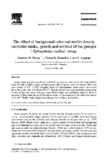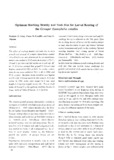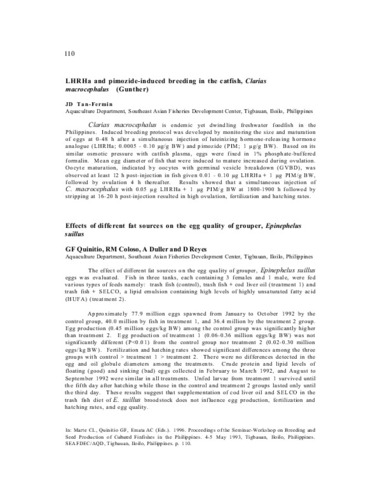| dc.contributor.author | Aya, Frolan | |
| dc.contributor.author | Garcia, Luis Maria | |
| dc.date.accessioned | 2017-09-12T07:48:06Z | |
| dc.date.available | 2017-09-12T07:48:06Z | |
| dc.date.issued | 2016 | |
| dc.identifier.citation | Aya, F. A., & Garcia, L. M. B. (2016). Growth response of cultured larvae of silver therapon Leiopotherapon plumbeus (Kner, 1864) in outdoor tanks in relation to fertilizer type and fish density. Journal of Applied Ichthyology, 32(6), 1186-1193. | en |
| dc.identifier.issn | 0175-8659 | |
| dc.identifier.uri | http://hdl.handle.net/10862/3221 | |
| dc.description.abstract | This study evaluated the effects of fertilizer type and fish density on early growth and survival of silver therapon Leiopotherapon plumbeus (Kner, 1864) larvae reared in outdoor tanks. In the first experiment, larvae (1.92 ± 0.09 mm total length) were stocked into nine, 4 m3 tanks at an initial density of 0.5 larvae L-1 and reared for 42 days at an ambient temperature of 28.8–30.7°C. Three treatments with three replicates each were compared: organic (chicken manure, OF) or inorganic fertilizers (ammonium phosphate, IF) applied once every 2 weeks, and the unfertilized (NF) tanks serving as the control group. Water quality, zooplankton densities, survival or growth of L. plumbeus larvae did not vary significantly in either fertilized or unfertilized tanks. Fertilization resulted in elevated nutrient concentrations, which did affect survival (2.10%–6.07%) of the fish larvae. In the second experiment, larvae were stocked at densities of 0.4 or 0.6 larvae L-1 in tanks fertilized at 4–5 days interval with OF and IF for 30 days. Growth performance of L. plumbeus larvae was affected by fish density, with significantly larger (20.04 ± 2.65 mm in total length) and higher specific growth rate (SGR; 6.97 ± 0.48% day-1) at 0.4 larvae L-1 than at 0.6 L-1. Fry production did not vary significantly between fish density treatment groups given the same fertilizer types, but survival rates were improved at 0.4 L-1. Together, production of L. plumbeus larvae in outdoor tanks can be optimized at a lower stocking density, regardless of the type of fertilizer used. | en |
| dc.description.sponsorship | This study was funded by SEAFDEC Aquaculture Department under Study Code Nr-01-F2013B. The authors thank Messrs. M.N. Corpuz and N.B. Olorvida for their technical assistance. | en |
| dc.language.iso | en | en |
| dc.publisher | Wiley | en |
| dc.subject | agrochemicals | en |
| dc.subject | ammonium | en |
| dc.subject | Ambient temperature | en |
| dc.subject | Nutrient concentrations | en |
| dc.subject | Above ground tanks | en |
| dc.subject | water tanks | en |
| dc.title | Growth response of cultured larvae of silver therapon Leiopotherapon plumbeus (Kner, 1864) in outdoor tanks in relation to fertilizer type and fish density | en |
| dc.type | Article | en |
| dc.citation.volume | 32 | |
| dc.citation.issue | 6 | |
| dc.citation.spage | 1186 | |
| dc.citation.epage | 1193 | |
| dc.citation.journalTitle | Journal of Applied Ichthyology | en |
| dc.subject.asfa | growth rate | en |
| dc.subject.asfa | fish | en |
| dc.subject.asfa | ammonium compounds | en |
| dc.subject.asfa | survival | en |
| dc.subject.asfa | growth | en |
| dc.subject.asfa | fertilization | en |
| dc.subject.asfa | density | en |
| dc.subject.asfa | larvae | en |
| dc.subject.asfa | zooplankton | en |
| dc.subject.asfa | phosphates | en |
| dc.subject.asfa | fertilizers | en |
| dc.subject.asfa | tanks | en |
| dc.subject.asfa | organic wastes | en |
| dc.subject.asfa | fry | en |
| dc.subject.asfa | water quality | en |
| dc.subject.asfa | temperature effects | en |
| dc.subject.asfa | fish larvae | en |
| dc.subject.asfa | mineral nutrients | en |
| dc.subject.asfa | stocking density | en |
| dc.identifier.essn | 1439-0426 | |
| dc.identifier.doi | 10.1111/jai.13138 | |



